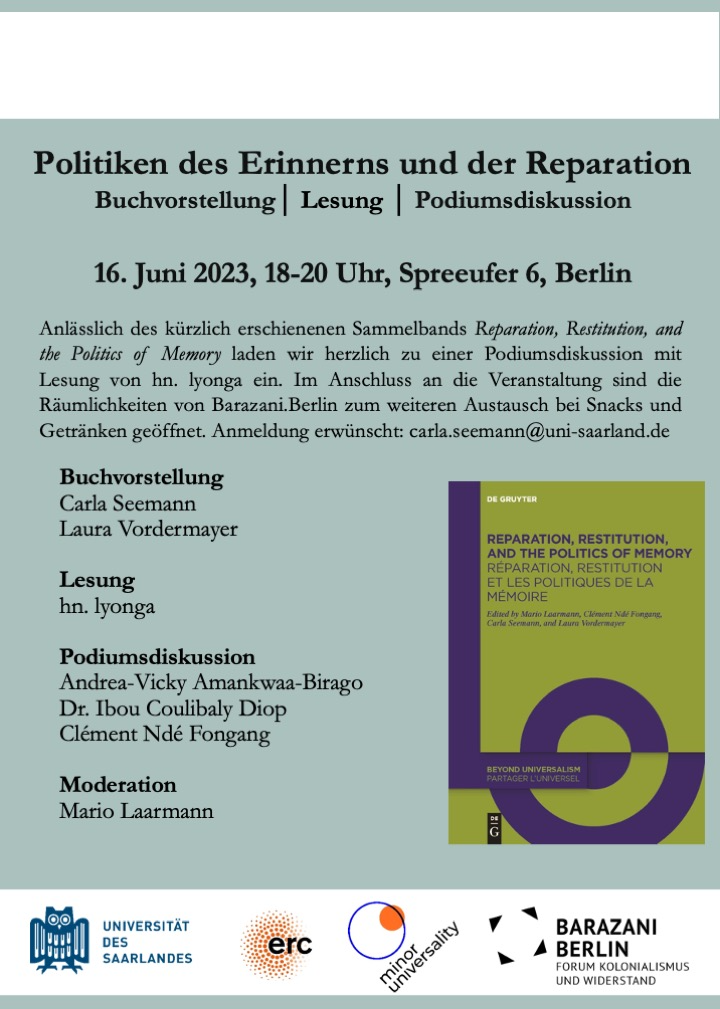Archive
Minor Universality, Cultural Translation, and the Politics of Language after Western Universalism
University of Hong Kong, June 26-28, 2024

Roundtable co-organised by The School of English at the University of Hong Kong (Christopher HUTTON) and the ERC-Project Minor Universality, Saarland University (Hélène THIÉRARD)
At the heart of power relations throughout modern history, translation and the politics of language have played an essential role in shaping the narratives of collective imaginaries, whether we think of the alleged superiority of English (and more generally of Western languages) over the languages of colonised people, or the construction of national languages and identities, not to mention postcolonial counter-discourses on translanguaging. Building on this centrality of translation and politics of language in both universalist and relativist discourses, we seek to understand how new, minor forms of universality are under way of being produced in contemporary cultural practices.
Panel discussion: Restitution of African cultural heritage
May 24, 2024 - Institut français Mainz – 07:00 PM

On 24 May 2024, Clément Nde Fongang took part in a panel discussion on the future of the restitution of African cultural heritage at the Institut français Mainz. Initiated by the New Afro Team as part of their exhibition "Restitution ... und dann? / Restitution... et après?", the discussion featured panelists, including Dr Anna-Maria Brandstetter, curator and director of the Institute of Ethnology and African Studies at the University of Mainz, along with four artists.
Lecture "Champollion before the College de France: a Micro-Historic Inquiry"
May 2, 2024 | 11:00 AM - 01:00 PM | Bibliotheca Hertziana, Max Planck Institute for Art History, Rome
On 2 May 2024, Professor Markus Messling will hold a lecture-cum-seminar at the Bibliotheca Hertziana - Max Plack Institute for Art History (Rome):
The statue of Jean-François Champollion, the decipherer of the Egyptian hieroglyphs, was designed by Frédéric-Auguste Bartholdi for the 1867 Universal Exhibition in Paris. The Third Republic installed it in the Collège de France. As an expression of the imperial consciousness of world and knowledge, the statue is undermined by its own pictorial programme and refers to problems of French universalism that Champollion himself had already reflected on.
It will be possible to follow the event also online on a VIMEO channel through the following link: https://vimeo.com/event/4177261
La littérature face au monde
Regards croisés franco-allemands avec Markus Messling et Jean-Marc Moura

L'Institut d'Études Françaises Saarbrücken reçoit le 23 avril 2024 deux professeurs invités, Markus Messling (Université de la Sarre) et Jean-Marc Moura (Université Paris Nanterre) pour un dialogue croisé autour de leurs deux livres parus récemment : Universalität nach dem Universalismus. Über frankophone Literaturen der Gegenwart (2019) et La totalité littéraire. Théories et enjeux de la littérature mondiale (2023). Originairement conçue pour la semaine franco-allemande en février, la soirée a été repoussée pour des raisons de santé.
Nous vivons une période mouvementée qui pose de manière parfois douloureuse la question de la communauté. Comment envisager le « faire ensemble » lorsque les conflits sourdent sur tous les continents ? Comment construire un futur commun après les vicissitudes de l’héritage colonial et la violence des guerres passées ? Quels sont les liens qui nous unissent aux autres, au sein d’une société mondialisée ?
La littérature nous fournit, tout au long de son histoire et jusqu’aux écritures les plus contemporaines, différents modèles pour envisager ces communautés culturelles, mondiales, universelles – et pour réfléchir aux fondements, peut-être, de celles qu’il nous appartient d’inventer.
Modération : Anne-Sophie Donnarieix
19h | IEF | Villa Europa | Kohlweg 7 | 66123 Saarbrücken
Entrée libre
Lectures and discussions: State of the Arts. A Ethnography of German Theatre and Migration
March 7 & 13, 2024 - University of Cambridge and University College London

Our scientific coordinator and postdoc in Cultural Anthropology, Jonas Tinius, has held two book presentations on his recent monograph State of the Arts (Cambridge University Press, 2023) at the Department of Anthropology at the University of Cambridge and University College London. The event in Cambridge was co-hosted by the German Graduate Research Seminars and the Cambridge University Social Anthropology Society, and Prof Martin Ruehl (German / History) responded to the presentation. In London, Profs Martin Holbraad and Georgina Born (both UCL) responded to the lecture.
Lecture "Universalism and the Politics of Memory: The Case of Jean-François Champollion"
March 14, 2024 | 15-17 Uhr | Napoli
Seminar Series "AROUND MODERNITY: Genealogies, Critiques, Deconstructions"
On 14 March 2024, Professor Markus Messling will hold a lecture-cum-seminar at the Università degli Studi di Napoli Federico II. The lecture is dedicated to the public memory of Champollion and the problem of French universalism from Champollion's world consciousness to today's discussions about the Champollion statue standing in front of the Collège de France. The event takes place by invitation of Professor Raffaele Carbone as part of the lecture series "Around Modernity: Genealogies, Critiques, Deconstructions" at the Dipartimento di Studi umanistici. Further information: raffaele.carbone@unina.it
Universalism & reparation
A conversation with David Scott (Columbia, New York)
For this edition, we spoke with anthropologist David Scott about postcoloniality, utopia, and cultural practices as a prism for reflecting upon questions of universality. Starting from the question of what happened to the promise of freedom after 1989 and to anti-colonial utopias, David Scott argues that these promises have failed, and that understanding the reasons for this failure must provide the basis for repairing and refashioning our future. Drawing on different perspectives - philosophical, socio-cultural and literary - we first discussed how to think about universality from a situated position, or how to conduct research in post-colonial spaces. Then, using the concept of an "ethic of generosity", Scott elaborates on how such an ethic can inform contemporary cultural politics and the questioning of identity and difference. Refocusing the importance of style and form for intellectual traditions and artistic practice, the conversation ends with a reflection on the past and the future: how can we link literature, postcolonial history and tragedy, so as to avoid fatalism and open up new possibilities of our societies? Does this involve revolution or reparation?
Lecture "Vers la négociation de nouvelles formes de relationnalité : Les enjeux du passé colonial entre le Sud global et l'Europe"
October 27, 2023 - Europäische Akademie Otzenhausen
As part of the Académie Européenne d'Automne of the Europäische Akademie Otzenhausen in cooperation with the Asko Europa-Stiftung, the Konrad Adenauer-Stiftung and the Centre international de formation européenne on the topic "L'Union européenne et le Maghreb : défis, enjeux et perspectives de coopération pour l'avenir", in which politically and civically engaged young people from Algeria, Morocco, Tunisia and Mauritania took part, Azyza Deiab gave a lecture as a doctoral student in the Minor Universality Project on 27 October 2023 on the topic "Vers la négociation de nouvelles formes de relationnalité : Les enjeux du passé colonial entre le Sud global et l'Europe".
Recently published: The English translation of "Universalität nach dem Universalismus"
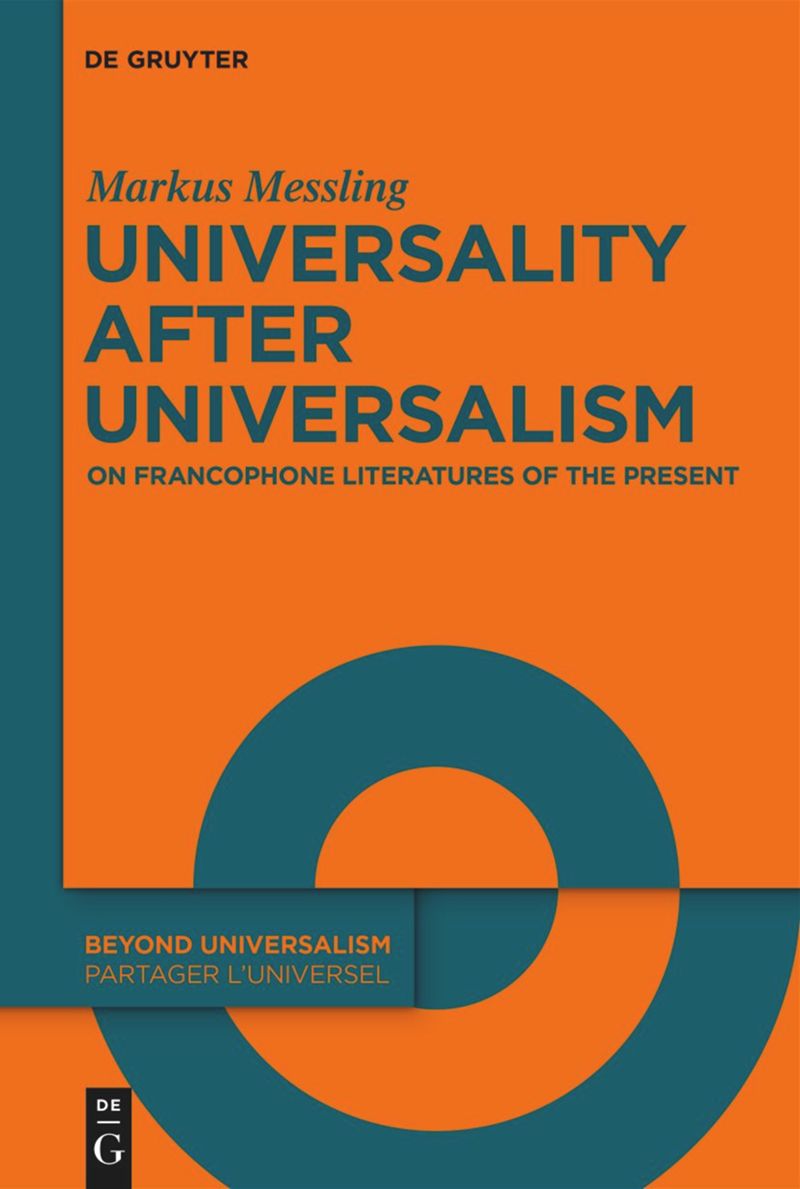
Following the French translation, Prof Messling's book Universalität nach dem Universalismus. Über frankophone Literaturen der Gegenwart (2019, Matthes & Seitz) has now also been translated into English by Michael Thomas Taylor as Universality after Universalism. On Francophone Literatures of the Present (Berlin/Boston: de Gruyter, series "Beyond Universalism. Studies on the Contemporary").
The idea of universalism inherited from the French Revolution has been strongly discredited by its colonial history; today, it is also the target of nationalist attacks. What remains of it? Now available in English, Markus Messling's critically acclaimed study shows how contemporary Francophone literatures seek, after European universalism, approaches to a new universality, without which knowledge and justice cannot be organised in world society.
With a foreword by Souleymane Bachir Diagne
Présentation de « L'universel après l'universalisme » à Paris
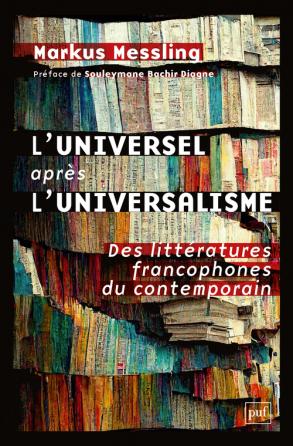
A l'occasion de la parution de L'universel après l'universalisme. Des littératures francophones du contemporain (trad. Olivier Mannoni, préface de Souleymane Bachir Diagne, Presses universitaires de France), Markus Messling est invité à des présentations de son livre à Paris.
Il sera à la Maison de la recherche de la Sorbonne nouvelle le lundi 16 octobre 2023, pour une présentation de son livre et un débat avec Alexandre Gefen. Vendredi 20 octobre, il sera en discussion au Théâtre du Vieux-Colombier, modérée par Anne-Sophie Donnarieix, dans le cadre de la 14e édition des rencontres « Littérature, enjeux contemporains », organisées par la Maison des écrivains et de la littérature.
Just published: Minor Universality. Rethinking Humanity After Western Universalism / Universalité mineure. Penser l’humanité après l’universalisme occidental
edited by Markus Messling und Jonas Tinius (de Gruyter, 2023)
The circulation and entanglements of human beings, data, and goods have not necessarily and by themselves generated a universalising consciousness. The "global" and the "universal", in other words, are not the same. The idea of a world-society remains highly contested. Our times are marked by the fragmentation of a double relativistic character: the inevitable critique of Western universalism on the one hand, and resurgent identitarian and neo-nationalistic claims to identity on the other. Sources of an argumentation for a strong universalism brought forward by Western traditions such as Christianity, Marxism, and Liberalism have largely lost their legitimation. All the while, manifold and situated narratives of a common world that re-address the universal are under way of being produced and gain significance. This volume tracks the development and relevance of such cultural and social practices that posit forms of what we call minor universality. It asks: Where and how do contemporary practices open up concrete settings so as to create experiences, reflections and agencies of a shared humanity?
With contributions by Isaac Bazié, Anil Bhatti, Jean-Luc Chappey, Elsie Cohen, Leyla Dakhli, Souleymane Bachir Diagne, Nicole Fischer, Albert Gouaffo, Stefan Helgesson, Fatma Hotait, Christopher M. Hutton, Ananya Jahanara Kabir, Mario Laarmann, Rukmini Bhaya Nair, Olivier Remaud, Gisèle Sapiro, Bénédicte Savoy, Maria-Anna Schiffers, Laurens Schlicht, Sergio Ugalde Quintana, Hélène Thierard, Khadija von Zinnenburg Carroll.
Part of the series: Beyond Universalism. Studies of the Contemporary, edited by Markus Messling
Book launch and panel discussion: Politics of Memory
16 June 2023, 18:00-20:00, Spreeufer 6, Berlin
On the occasion of the recently published edited volume on Reparation, Restitution, and the Politics of Memory, we cordially invite you to a panel discussion with a reading by hn. lyonga. After the event, the premises of Barazani.Berlin will be open for further exchange over snacks and drinks.
La traduction française de « Universalität nach dem Universalismus » est sortie

Le livre Universalität nach dem Universalismus. Über frankophone Literaturen der Gegenwart (2019, Matthes & Seitz) est maintenant disponible dans la traduction d'Olivier Mannoni sous le titre L'universel après l'universalisme. Des littératures francophones du contemporain paru aux Presses universitaires de France (PUF). Le livre est publié avec une préface de Souleymane Bachir Diagne.
La mise en œuvre coloniale qui en a été faite a fortement discrédité le concept d'universalisme sur le plan politique. Dans le même temps, les idéaux d'une société mondiale cosmopolite, qui vont de pair avec lui, font l'objet d'attaques toujours plus vives des forces nationalistes. Que reste-t-il des idéaux universalistes ? Cette question est traitée dans des littératures contemporaines francophones que Markus Messling analyse comme une remise en cause radicale de ces idéaux qui ont jadis trouvé leur capitale à Paris, avec la Révolution française : liberté, égalité et solidarité. Comment trouver après l'universalisme européen les approches d'une nouvelle universalité sans laquelle il est impossible d'organiser connaissance et justice dans la société mondiale ? Cette question se révèle être un problème de mise en forme narrative du monde.
« Le livre de Markus Messling pose une thèse, essentielle, qui est que la fin de l'universalisme européen n'est pas celle de l'universalité mais peut-être bien son commencement. Les lectures d'auteurs 'francophones' aussi divers que Mathias Enard, Léonora Miano, Kossi Efoui, Camille de Toledo, Shumona Sinha ou Wajdi Mouawad disent, à leur manière propre, contre la seule 'soumission' à une 'mélancolie' n'ouvrant sur rien, que la fin de l'universalisme européen est la tâche de retourner la 'nostalgie' en 'ressource pour l'avenir'. C'est-à-dire, contre la prétention d'un universalisme impérialiste, de savoir faire usage de la capacité de relativiser et de la force décolonisatrice qui lui est attachée, mais en sachant également ne pas s'enfermer dans un relativisme qui ne traduirait alors qu'une conception carcérale des identités culturelles. Ce livre invite et aide à penser cet universel (multi)latéral dont le temps est maintenant. »
Souleymane Bachir Diagne, Columbia University
Guest lecture of Prof. Dr. Souleymane Bachir Diagne l Conférence invitée avec Prof. Dr. Souleymane Bachir Diagne
After the presentation by Prof. Olivier Remaud, Prof. Omri Boehm, Prof. Soumaya Mestiri and Dr. Julia Christ in the context of the lecture series "Universalism - History, Theory, Knowledge", Prof. Dr. Souleymane Bachir Diagne (Columbia University, New York) will give a paper on the topic "L'Universel et le postcolonial" on 10 February 2023 from 17:15 to 18:45. The conference will take place at Saarland University and online via MS Teams.
Program in Experimental Critical Theory at UCLA (Prof Markus Messling)
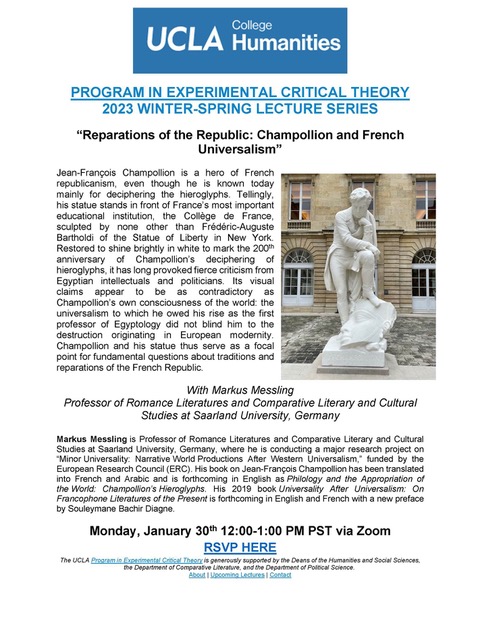
On Monday, 30 January 2023, Prof Markus Messling is giving a talk in the Winter / Spring 2023 lecture series and program in Experimental Critical Theory at the University of California, Los Angeles entitled “Reparations of the Republic: Champollion and French Universalism”.
Guest lecture of Dr. Julia Christ l Conférence invitée avec Dr Julia Christ
After the presentation by Prof. Olivier Remaud, Prof. Omri Boehm and Prof. Soumaya Mestiri in the context of the lecture series "Universalism - History, Theory, Knowledge", Dr. Julia Christ (CNRS/EHESS) will give a paper on the topic "Les dilemmes de l’universel moderne" on 25 January 2023 from 10:00 to 12:00. The conference will take place at Saarland University and online via MS Teams.
Guest lecture of Prof. Soumaya Mestiri l Conférence invitée avec Prof. Soumaya Mestiri
After the presentation by Prof. Olivier Remaud and Prof. Omri Boehm in the context of the lecture series "Universalism - History, Theory, Knowledge", Prof. Soumaya Mestiri (Université de Tunis) will give a paper on the topic "Décoloniser le féminisme" on 18 January 2023 from 10:00 to 12:00. The conference will take place at Saarland University and online via MS Teams.
Visiting Scholar at UCLA (Dr Jonas Tinius)
Dr Jonas Tinius has been invited to spend the Winter Quarter 2023 (January-March) as a Visiting Scholar in the Department of Worlds Arts and Cultures / Dance at the University of California, Los Angeles.
Universalisme & préhistoire
Entretien avec Maria Stavrinaki (Paris I Panthéon-Sorbonne)
Pour la septième conversation de notre série, le groupe de recherche Minor Universality a discuté avec l'historienne de l'art Maria Stavrinaki de l'invention de la préhistoire par les modernes et du trouble que cela apporte dans l'histoire universelle. Stavrinaki soutient que les « deux extrémités du temps humain - la préhistoire et la modernité » partagent une expérience d'anxiété et de choc, à laquelle les êtres humains ont répondu par des remèdes symboliques. La préhistoire, à la fois universelle et fragmentaire, permettrait ainsi d'apercevoir la construction des origines et des fins ; l'avant et l'après de l'humanité. Pour les avant-gardes modernistes en Europe, la préhistoire est devenue une source d'imagination pour la pensée historique elle-même. Comme elle le dit, « les Modernes ont découvert un allié exceptionnel dans la préhistoire ». Dans cette conversation, l'équipe de recherche Minor Universality aborde les questions de la vérité historique, de l'anthropologie, de l'évolutionnisme et de l'espoir utopique des avant-gardes artistiques. L'époque actuelle étant marquée à nouveau par la menace imminente d'une destruction totale mutuellement consentie comme conséquence de la guerre, nous débattons également des horizons (dystopiques) évoqués par l'ère atomique et la possibilité d'une fin de l'histoire (humaine).
Maria Stavrinaki est Maîtresse de conférences habilitée à diriger les recherches à l'Université Paris I Panthéon-Sorbonne, où elle enseigne depuis 2004 l'histoire et la théorie de l'art (19e-21e s.). Co-commissaire de l'exposition « Préhistoire. Une invention moderne » (Centre Pompidou, mai 2019), elle est aussi l'auteure de « Saisis par la préhistoire. Récits sur l'art et le temps des modernes » (avril 2019). Ce livre vient d'être traduit en anglais chez Zone Books sous le titre "Transfixed by Prehistory. An Inquiry into Modern Art and Time”.
Guest lecture of Prof. Omri Boehm l Conférence invitée avec Prof. Omri Boehm
After the presentation by Prof. Olivier Remaud (EHESS), Prof. Omri Boehm will give a paper on "Radical Universalism" on 14 December 2022 from 18:00 to 20:00. The conference will take place online via MS Teams.
Série de conférences organisées par Prof. Messling | Lecture Series by Prof. Messling
Prof. Olivier Remaud (EHESS) commencera avec le thème « L'universel et les vivants » | Prof. Olivier Remaud (EHESS) opens with the topic "L'universel et les vivants"
Dans le cadre du cours actuel « Universalisme - Histoire, Théorie, Savoir », le prof. Markus Messling organise une série de conférences invitées, s'inscrivant dans le cadre du projet Minor Universality (ERC). Le mercredi 30 novembre 2022, de 10h à 12h, le professeur Olivier Remaud (EHESS) ouvrira cette série avec le thème « L’universel et les vivants ». La conférence aura lieu en présentiel dans la salle 0.13.1 du bâtiment en E 1.2 et en ligne via MS Teams.
In the context of his ongoing lecture series "Universalism - History, Theory, Knowledge", Prof. Markus Messling is organising a number of guest lectures supported by the Minor Universality ERC project. On Wednesday 30 November 2022, from 10:00 to 12:00, Prof. Olivier Remaud (EHESS) will speak on the topic "L’universel et les vivants". The conference will take place in room 0.13.1 of the E 1.2 building and online via MS Teams.
Conférences suivantes I Forthcoming lectures
- Mercredi, 14 decembre 2022, 18h - 20h, (en ligne) : Prof. Omri Boehm (The New School for Social Research, NY) : « Radical Universalism ».
- Mercredi, 18 janvier 2023, 10h -12h : Prof. Soumaya Mestiri (Université de Tunis): « Décoloniser le féminisme ».
- Mercredi, 25 janvier 2023, 10h-12h : Dr. Julia Christ (CNRS/EHESS) « Les dilemmes de l’universel moderne ».
- Vendredi, 10 février 2023, 16h-18h : Prof. Souleymane Bachir Diagne (Columbia University, NY): « L’universel et le postcolonial ».
- Wednesday, 14 December 2022, 6-8 pm, (online): Prof. Omri Boehm (The New School for Social Research, NY): “Radical Universalism”.
- Wednesday, 18 January 2023, 10-12 am: Prof. Soumaya Mestiri (University of Tunis): "Décoloniser le féminisme".
- Wednesday, 25 January 2023, 10 am-12 pm: Dr. Julia Christ (CNRS/EHESS) "Les dilemmes de l’universel modern".
- Friday, 10 February 2023, 4-6 pm: Prof. Souleymane Bachir Diagne (Columbia University, NY): "L’universel et le postcolonial".
ERC Minor Universality Team am El Colegio de México | ERC Minor Universality at El Colegio de México
Das ERC-Forschungsteam von Prof. Markus Messling reist im Oktober zu einer internationalen Tagung und Forschungsreise ans El Colegio de México, in Kooperation mit dem Projektpartner Prof. Sergio Ugalde. Das Thema der Tagung ist „Universality after Universalism? Questions of Philology, Translation, and Intellectual Biographies".
The ERC research team of Prof. Markus Messling will travel to El Colegio de México in October for an international conference and research trip, in cooperation with project partner Prof. Sergio Ugalde. The subject of the conference is "Universality after Universalism? Questions of Philology, Translation, and Intellectual Biographies".
Champollion devant l'universalisme républicain
Vor 200 Jahren hat Jean-François Champollion vor der Pariser Académie royale des inscriptions et belles-lettres seine „Lettre à M. Dacier“ präsentiert, die eine erste phonetische Systematik zur Entzifferung der ägyptischen Hieroglyphen vorschlägt und sicher einer der größten Erfolge der europäischen Philologie gewesen ist. Dazu ist auf La vie des idées des Collège de France ein Essay von Prof. Markus Messling erschienen.
The Pregnant Oyster – Doubts on Universalism
Exhibition of the ERC Minor Universality Residency Programme at Haus der Kulturen der Welt in Berlin
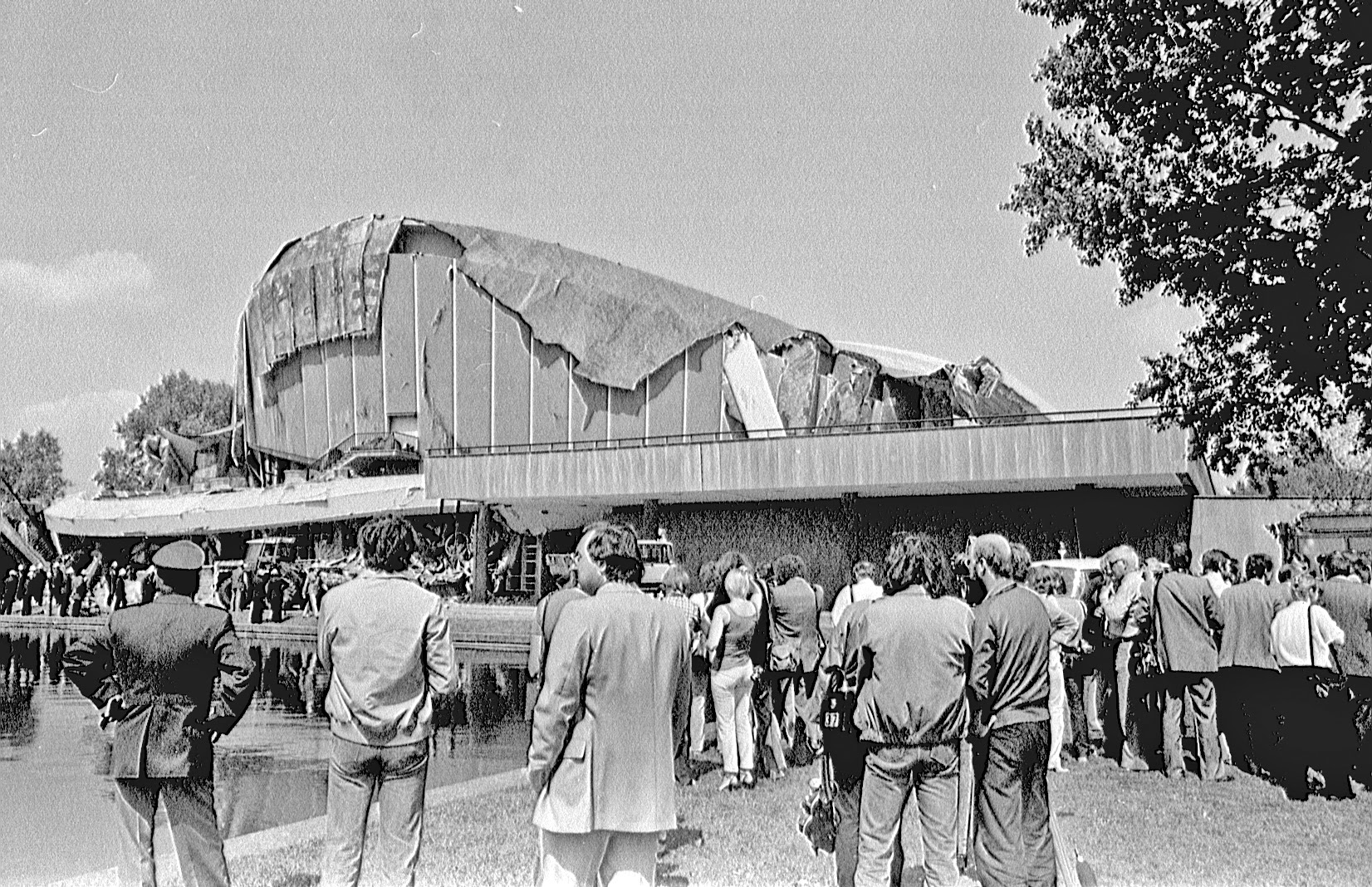
An exhibition (Thu, Jun 30 - Sun, Jul 3) that asks how it is possible to think of world, humanity and justice despite the internal paradoxes of Western Universalism – and how to do so beyond relativism and identity fragmentation.
When the free-floating modernist roof of the Congress Hall collapsed in 1980, a Western symbol of freedom crumbled. The exhibition The Pregnant Oyster – Doubts on Universalism traces cracks and constructions of minor narratives of world after Western Universalism. Taking inspiration from the ambivalent nickname that Berliners gave the building that is the home of HKW since 1989 due to its form, it asks how horizons of a shared world are born out of concrete, incorporated, situated narratives. The oyster as a queering animal that changes its gender at will, occasionally producing precious surprises, fragile and valuable, is a metaphor for this meandering search. This exhibition, conversations and workshops are the result of the research and residency project Minor Universality, which brings together positions across the visual arts, writing and the sonic. The propositions in the exhibition derive from situated forms of doubt and engagements of the dominant through the minor and share an urgency to work with the birth of a world within the ruins of the former West.
With contributions by: Filipa César, Emeka Ogboh, SAVVYZAAR (Lynhan Balatbat-Helbock, Kelly Krugman) and SAVVY.doc (Sagal Farah), Adania Shibli, Camille de Toledo
ERC Minor Universality in Tunis
The ERC project Minor Universality led by Prof. Markus Messling organised a week of international conferences in cooperation with Prof. Mohamed Kerrou (Université de Tunis El-Manar) and Dr. Leyla Dakhli (CNRS/Centre Marc Bloch) at the Académie tunisienne des sciences, des lettres et des arts (Beït al-Hikma) on the topic of Universalismes, hégémonies et identités and at the Centre des arts vivants de Radès on the topic of Universalisme et Incertitudes; with the participation of Giovanni Levi, Mondher Kilani, Jellal Abdelkafi, Vincenzo Chicchelli, Franck Hofmann, Essedik Jeddi, Faouzi Mahfoudh, Imed Melliti, Sylvie Octobre.
In the meetings, workshops and talks in Tunis, the ERC project involved numerous partners as well as artists from the Artists-in-Residence programme (Lynhan Balatbat-Helbock, Kelly Krugmann, Adania Shibli) for joint reflections and discussions with Tunisian artists (Hichem Ben Ammar, Mohamed-Ali Berhouma, Aïcha Filali, Slim Gomri, Nadia Jelassi, Mohamed Ben Soltane).
More on the conference topic and programme
Universalism & narration
A Conversation with Adania Shibli (Palestine)
For our sixth conversation in the series “Universalism & … “, the Minor Universality research team speaks with writer and researcher Adania Shibli (Palestine).
Our conversation traces writing, in Shibli’s work, as an experience of learning to live as well as of approaching the unwritten, the stammered, the stuttered. We speak about the modern 19th century novel as a form through and against which to find other, minor, gestures and methods to enter writing as a non-hierarchal, anti-authoritarian form. How can writing be designed by fear, loss, and the unwritten? If literature has been complicit in nation-building and modern formations of identity, can writing also engender a different form of engagement with and for others? If so, what forms will it take?
Universalism & the partisan position
A Conversation with Arjun Appadurai (New York / Berlin)
In this fifth episode of our series, the Minor Universality research team is in conversation with the anthropologist Arjun Appadurai, professor at the Bard Graduate Centre, New York, and at the Humboldt-Universität zu Berlin, where he is associated with the Department of European Ethnology. This conversation traverses thinking about globalisation and cosmopolitanism, but asking what happens to understandings of the nation state in an era of its reinstatement. Has the idea of a global life and consciousness been rendered illusory by its increasing challenge from identitarian movements and populist politics? Traversing his own biographical trajectory as a public intellectual, with movements from India to the US and Europe, we discuss the relation of theories of transnationalism with the real experience of émigré intellectual politics. We also discuss the legacy of Arjun Appadurai's own archive and its reinstatement as a local research library, asking what happens to the aftermath of the social life of things, once they move from academic to artistic spheres of valuation. After all, as we notice in a time of increasing standstill and questioning of flows of people and things, and diseases that render frontiers absurd, we also ask what role institutions like the academy or museums play in acting as facilitators or perhaps as immobilisers of such movements. The conversation ends with a fervent plea for a partisan position, a push to act, as academics and public intellectuals, as "mediators, facilitators, and promoters of the ethics of possibility against the ethics of probability”.
Restitution, Reparations, Reparation – Towards a New Global Society? International Summer School│ Call for Participation
The Cluster for European Research (CEUS) of Saarland University and Villa Vigoni - German-Italian Centre for European Dialogue are organising an international summer school on questions of the reparation and/or irreparability of subjectivity, history, and nature from September 9-13, 2021 at Villa Vigoni. Interested PhD students from the humanities and social sciences as well as graduate students holding a Master’s degree that are about to start their doctoral studies can apply by 1st July 2021.
Universalism & multilateralism
A conversation with Souleymane Bachir Diagne (Columbia, New York)
For the fourth episode of its series, the Minor Universality research team spoke with the philosopher Souleymane Bachir Diagne, Professor of French and Philosophy at Columbia University (New York), where he also directs the Institute for African Studies. This conversation reflects on how to engage universality from a decolonial perspective. Reflecting on the inequalities and injustice that persist in the contemporary world, how can communities that find themselves in a struggle for emancipation think the universal and humanity? Can we conceive of a universal that is not exclusive or imperial? Drawing on a philosophy of decolonial thought and translation, Souleymane Bachir Diagne shows how we can rethink the universal from the lateralism induced by translation, as opposed to a "vertical universal", a universal self-proclaimed from a dominant language/culture. So how can we think today about a politics of a humanity in the making; an ethics of human rights that would take into account its own limits without falling into relativism? The demand for reparations, whether symbolic or financial, for the violence and ills inflicted by slavery and colonialism is long-standing. Finally, beyond the possibility of "repairing" or "compensating", should we not start by "addressing the irreparable" as the only starting point for a new common humanity? And what is Europe's place in a world that must learn to build itself and have a common vision?
Lecture series “Narration and community”
The lecture series on "Narration and community" features three lectures with subsequent discussion by Carla Seemann (Saarland University), Adania Shibli (HKW Berlin/Bir Zeit University) and Laurent Demanze (Université Grenoble Alpes).
Universalism & knowledge(s)
A conversation with Gisèle Sapiro (EHESS, Paris)
For the third episode of our series, the Minor Universality research team spoke with sociologist Gisèle Sapiro. This conversation reflects on the political relevance of a sociological quest for objectivity and rationality in an era of alternative facts and identity politics. Building on the Bourdieuian sociological tradition, she surveys the pervasive impact of a thinking across the threshold of a subject-object distinction. Can the habitus operate a cross-cultural analytic for interrogating fields for the concrete production of a minor universality? The emphasis on processes for the production of knowledge leads, eventually, to the relation between Pierre Bourdieu and Jacques Derrida, who were close to one another since the Algerian war. Do we have to defend Derrida and deconstruction against the accusation of rendering impossible any notion of truth?
Launch of ERC & HKW Residency Programme
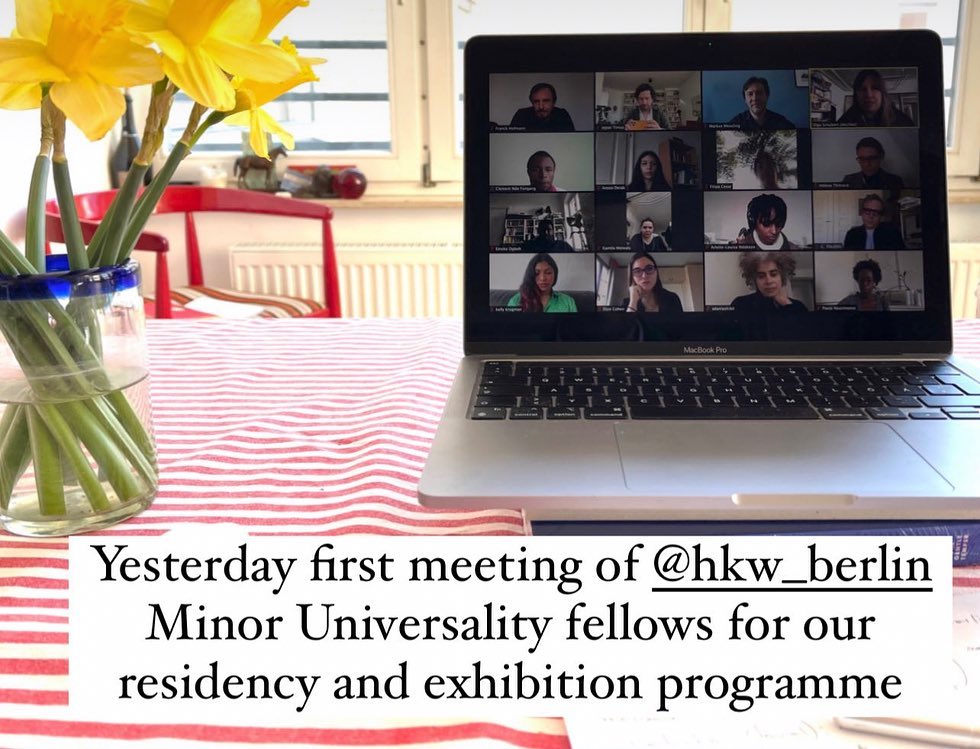
We are excited to have launched our residency programme in collaboration with the Haus der Kulturen der Welt (HKW) in Berlin with a first digital meeting. Over the course of 2021, the six invited artists will develop idiosyncratic perspectives on narration, curation, and minor universality, leading to an exhibition in Berlin in 2022. For more information on the residency and the fellows, please visit the dedicated project website.
Universalism & concrete (hi)stories
An Encounter with Giovanni Levi (Università Ca’ Foscari di Venezia)

Historian Giovanni Levi is in conversation with the Minor Universality research team about the tradition of the microstoria, which he co-founded in Italy in the 1970s. The historiographic approach of the microstoria, which found a resounding echo first in Europe, and then later in the United States, responded at the time to a crisis of the discipline by proposing to abandon the study of masses and structures, and to place individual actors and concrete narratives at the centre of its inquiry. Looking at ordinary worlds through a microscope, as it were, produced the kind of shift that changed our understanding of History. For this reason, the microstoria has for years been debated within the framework of a global history. What resources does the microstoria offer to rethink universalism?

New book series: Beyond Universalism. Studies on the Contemporary / Partager l’universel. Études sur le contemporain
The first volume 1769-1989: The Epoch of Universalism / L’époque de l’universalisme, ed. by Franck Hofmann & Markus Messling, has just been published.
2019 witnessed the 30th anniversary of the German reunification. But the remembrance of the fall of the Berlin Wall coincided with another event of global importance that caught much less attention: the 250th anniversary of Napoleon Bonaparte’s birth. There is an undeniable historical and philosophical dimension to this coincidence. Napoleon’s appearance on the scene of world history seems to embody European universalism (soon thereafter in the form of a ‘modern’ imperial project); whilst scholars such as Francis Fukuyama saw in the events of 1989 its historical fulfilment. Today, we see more clearly that the fall of the Berlin Wall stands for an epistemic earthquake, which generated a world that can no longer be grasped through universal concepts. Here, we deal with the idea of Europe and of its relation to the world itself. Picking up on this contingency of world history with an ironic wink, the volume analyses in retrospect the epoch of European universalism. It focusses on its dialectics, polemically addressing and remembering both 1769 and 1989.
Histoire / histoires
Le concret et l’universel dans les SHS
Konkretheit und Universalität in den Kultur- und Sozialwissenschaften
Atelier de recherche à la Villa Vigoni, 2-6 septembre 2020
Internationaler Workshop in der Villa Vigoni, 2.-6. September 2020
ERC Minor Universality en coopération avec/in Kooperation mit:
Villa Vigoni – German-Italian Center for the European Dialogue
Der internationale Workshop des ERC-Projekts „Minor Universality“ widmet sich einer zentralen Frage der gegenwärtigen Kultur- und Sozialwissenschaften: Wie kann Universalität nach der notwendigen epistemischen und ethischen Kritik am westlichen Universalismus (noch) gedacht werden? Ausgehend von Konzepten wie Konkretheit und Situiertheit, Erzählung und Übersetzung, Erinnerung und Geschichte, lädt die Tagung NachwuchswissenschaftlerInnen aus den Kultur- und Sozialwissenschaften ein, Fallstudien zur Erforschung von Situiertheit und Universalität aus verschiedenen disziplinären und wissenschaftskulturellen Perspektiven zu diskutieren. Von einem methodenkritischen Standpunkt aus möchte das „Minor Universality“-Forschungsprojekt neue Impulse zur Erforschung von Universalisierungsprozessen setzen, wie sie aus Spannungen zwischen Lokalem und Allgemeinem, Verkörperung und Bewusstsein, Empirie und Theorie auftreten. Eine wesentliche Grundlage der Diskussion wird die Microstoria darstellen.
L’atelier de recherche du projet de recherche ERC « Minor Universality » sera dédié à une question fondamentale des sciences humaines et sociales contemporaines : comment aborder l’universel après la nécessaire critique épistémique et éthique de l’universalisme occidental ? En s’appuyant sur des concepts tels que la matérialité et la réparation, la narration et la traduction, l’atelier de recherche invite de jeunes chercheur_e_s à répondre à la question de savoir comment des pratiques culturelles et sociales contemporaines produisent, à partir de contextes concrets, des expériences, des réflexions et des agentivités qui contribuent à faire émerger une humanité partagée. Mettant l’accent sur les défis méthodologiques de l’étude du concret et de l’universel, le projet de recherche vise à réfléchir sur les processus d’universalisation générés par des tensions entre le local et l’universel, l’incorporation et la conscience, l’empirisme et la théorie. Une source importante d’inspiration sera la micro-histoire.
Keynote und/et interview mit/avec Giovanni Levi (Università Ca’ Foscari di Venezia)
Leitung/Sous la direction de Markus Messling (ERC Minor Universality, Universität des Saarlandes)
Veuillez trouver le programme par le lien; das Programm finden Sie hier.

Universalism & Revolution
An Encounter with Leyla Dakhli

The Minor Universality research team interviews the historian Leyla Dakhli about universalism and the recent revolutions in the Arab Mediterranean region. Can we understand the revolutionary events of the contemporary world based on models of the French Revolution of 1789? Which claims to universality are at stake in revolutions and their interpretations?
A conversation about revolution and world history, transregional perspectives and multilingualism, events and the quotidian, materiality and archives, as well as the Mediterranean as a space for the negotiation of a new common world-society, which cannot be thought without taking into account colonial violence. These aspects connect to the core question of the Minor Universality research project, which addresses the potential of micro-perspectives to narrate universality anew.
Leyla Dakhli is a historian and a specialist in the intellectual and social history of the contemporary Arab world. She is researcher at the French National Centre for Scientific Research (CNRS) and the Centre Marc Bloch in Berlin.
You can watch the edited conversation on the Minor Universality YouTube channel.
Universalisme & Révolution
Entretien avec Leyla Dakhli
L’historienne Leyla Dakhli répond aux questions de l’équipe de recherche Minor Universality sur l’universalisme et les récentes révolutions de la Méditerranée arabe. Peut-on rendre compte des événements révolutionnaires du monde contemporain à partir du modèle de la Révolution Française de 1789 ? Quelle universalité les révolutions – et les lectures qui en sont faites – font-elles valoir ?
L’entretien porte sur la révolution et l’histoire mondiale et interroge les rapports entre approche transrégionale et plurilinguisme, événementialité et vie quotidienne, matérialité et archives. Envisager la Méditerranée comme un espace où se négocie une nouvelle société mondiale commune, c’est penser celle-ci à partir de l’histoire de la violence coloniale. Tous ces aspects renvoient à une question centrale du projet Minor Universality concernant le potentiel de la micro-perspective pour appréhender l’universalité autrement.
Leyla Dakhli est spécialiste de l’histoire sociale et intellectuelle du monde arabe contemporain. Elle est chargée de recherche au Centre National de la Recherche Scientifique (CNRS) et rattachée au Centre Marc Bloch à Berlin.
L’entretien sera disponible sur la chaîne YouTube du groupe Minor Universality à partir du 14 juillet.
1769 - 1989 - THE EPOCH OF UNIVERSALISM
A first conference was organized at Villa Europa Saarbrücken in September 2019, bringing together many project partners:
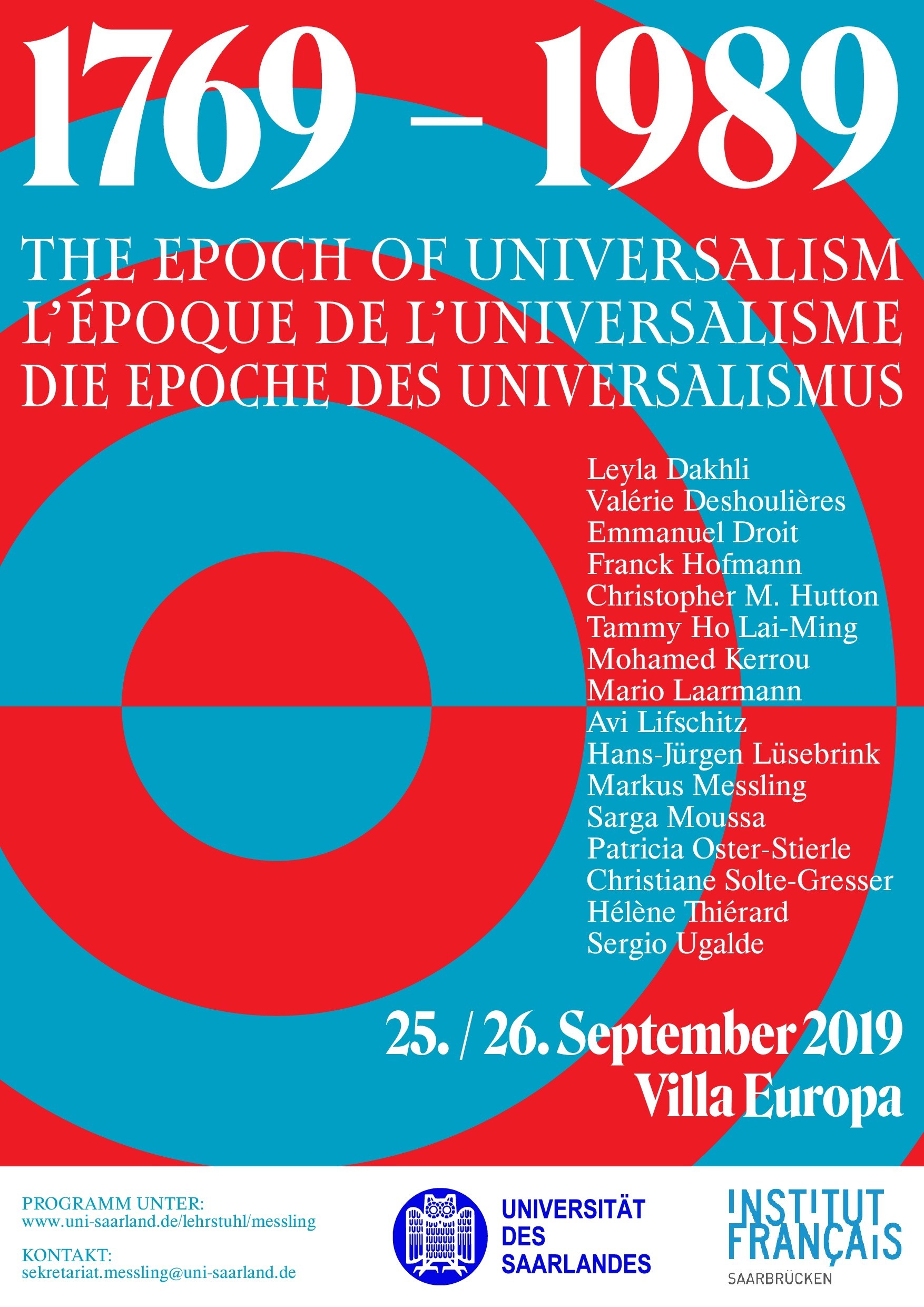
The current year will be characterized by the 30th anniversary of the German unification. But the remembrance of the fall of the Berlin Wall coincides with another event of worldwide importance that finds much less attention: Napoléon Bonaparte’s 250th anniversary. However, the historical-philosophical dimension of the coexistence of these two circumstances cannot be neglected: Napoléon’s appearance on the scene of world history marks the victory of European Universalism (very soon in the form of a ‘modern’ Imperial project); and some intellectuals, as Francis Fukuyama, thought that 1989 would have signified its historical fulfilment. Today, we see more clearly that the fall of the Wall stands for an epistemic earthquake which the Parisian philosopher Lionel Ruffel has called the “brouhaha” of a world that can be grasped no more through universal concepts. Here we deal with the idea of Europe and of its relation to the world itself. Picking up this contingency of world history with an ironic wink, the symposium seeks to analyse in the aftermath the epoch of European Universalism, focussing on its dialectics which are polemically addressed together remembering 1769/1989.
Contact
Team
minor.universality(at)uni-saarland.de
Professor Markus Messling
markus.messling(at)uni-saarland.de




